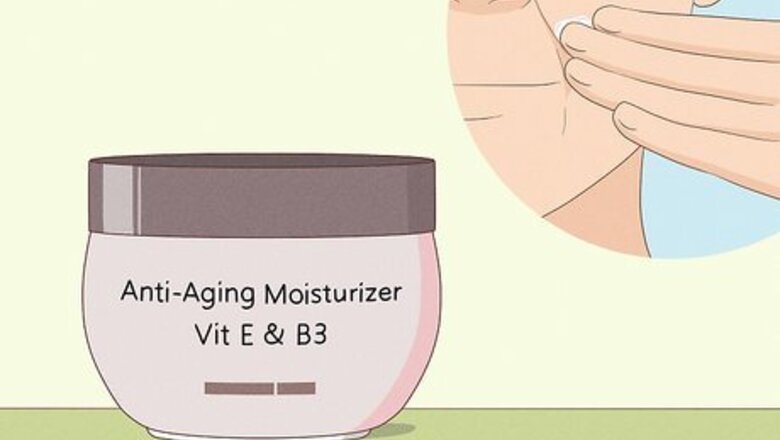
views
Moisturize your skin with an anti-aging product.
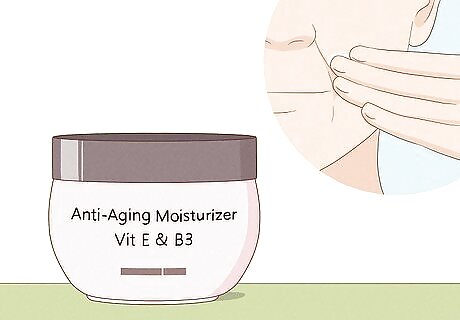
Shop for a moisturizer that has vitamin E and B3 which improve elasticity. Although there aren't miracle creams or lotions that will tighten your skin, there are vitamins that can help your body produce more collagen so your skin looks tighter. Use an anti-aging moisturizer at least once a day or whenever your skin feels dry. For even better results, massage your skin for 1 minute after you apply the cream. You can also find body lotions that contain vitamin E and B3 so you can tighten loose skin throughout your body. You might see the vitamins listed on the product's ingredient label. Some might be listed by their chemical name. For example, nicotinamide, nicotinic acid amide, and niacinamide are all forms of vitamin B3 while disodium lauriminodipropionate tocopheryl phosphates is vitamin E.
Apply a firming serum to your skin.
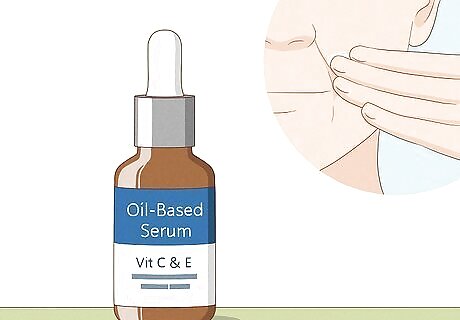
Read labels to find an oil-based serum that's got vitamin C and E. You may also find a firming cream that contains these vitamins. When you rub the serum into your skin the vitamins work deep down to stimulate collagen and help your skin repair itself. You can use the serum once a day. It's easy to add a serum to your skincare routine—just rub a few drops between your fingers and massage your face once a day. It's fine to use the serum before bed or first thing in the morning.
Use an egg white mask for temporary tightening.
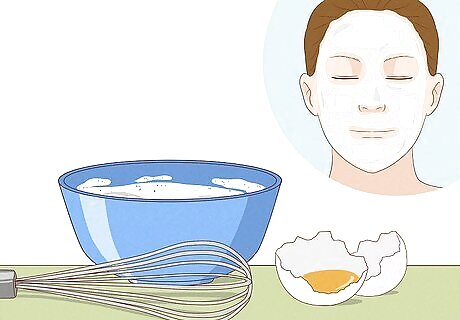
Whisk 1 egg white until it's foamy and spread it on your skin. Leave the egg white on for 10 to 20 minutes before you rinse it off with water. Then, apply a gentle moisturizer. The egg mask home remedy works by reducing inflammation and soothing your skin, which can make it appear tighter for a while. You may have heard that you can add lemon juice or baking soda to egg masks, but dermatologists argue that these ingredients are too harsh for your skin.
Take oral collagen supplements.
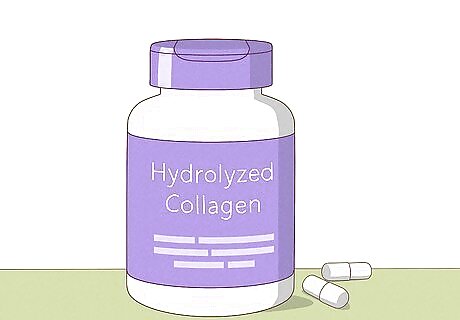
Buy hydrolyzed collagen capsules and follow the dosing instructions. Although more research is needed, studies suggest that collagen supplements can improve skin elasticity. Read the manufacturer's dosing recommendations—researchers aren't sure yet about how much collagen you need to see the benefits. Since many collagen products aren't vegetarian, look for a vegan collagen supplement if you're avoiding animal products.
Do strength training exercises to build muscle.
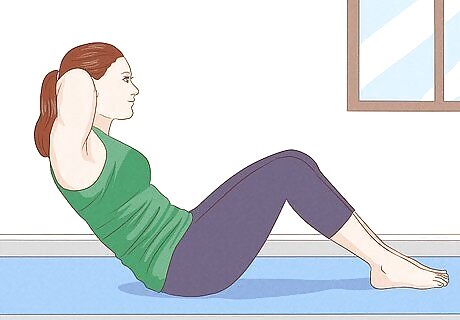
Try resistance training to fill out slightly sagging skin. If you've lost weight and your skin looks loose, build muscle so your skin looks firm. Start with a gentle cardio warmup before you do a series of sit-ups or pull-ups if you're targeting the skin around your abs. Bench presses are also great for tightening muscles around your stomach, arms, and back. Make sure to ease into a routine. Start with only light amounts of weight and work your way up. If you feel strained, it's totally fine to take a break. For example, do a 6- to 8-minute cardio warmup followed by 5 deadlift sets with 6 to 8 reps. Then, do 5 bench press sets of 6 to 8 reps.
Practice daily facial stretches to make your skin look firmer.
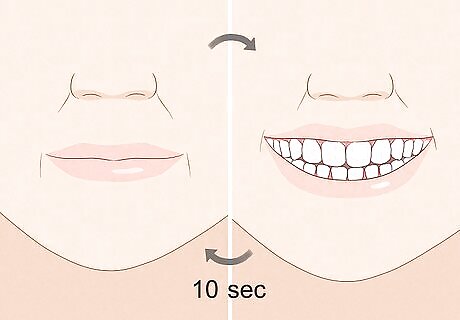
Apply lotion to your face and stretch the muscles around your mouth. Studies show that facial exercises can enhance your muscle function. This can help your skin look firmer and tighter. It can even reduce the appearance of scars. Try to do these simple exercises at least once a day: Smile in slow motion so you gradually lift the corners of your mouth up until you have a full smile. Hold the smile for 10 seconds before you gradually relax the muscles. To stretch your cheeks, smile through your cheeks. Then, press down on your cheekbones for 10 seconds. Release and repeat it 5 times.
Get a chemical peel to reveal smoother, tighter skin.
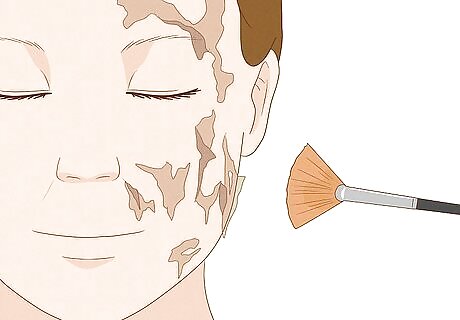
Your dermatologist will apply a chemical solution and leave it on your skin. The solution removes the top layer of your skin so the new skin underneath appears even, tight, and smooth. Chemical peels are frequently performed on sagging skin in the neck and jowl area. Talk with your dermatologist about how strong of a peel they'll use since you can have light to deep peels depending on your skin's condition. You'll probably need several treatments before you notice tighter skin. It also takes a few weeks for the redness from the procedure to wear off. You may also experience swelling, blisters, and sensitivity to sunlight. Chemical peels range in price from around $150 into the thousands depending on how deep the peel goes.
Try ultrasound therapy to tone your skin.
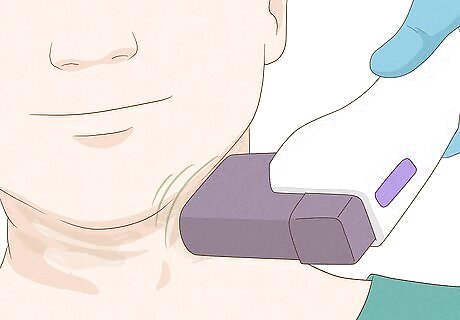
Ultrasound waves penetrate your collagen to stimulate new collagen growth. Your dermatologist will spread gel on your skin, usually around your brow, neck, and chin, before they press a handheld ultrasound device on the area. This sends ultrasound energy into the collagen to revitalize it. Although this short procedure can feel uncomfortable, you'll usually only need one session. Side effects include slight, temporary swelling, tingling, and tenderness. Ultrasound therapy costs around $1800 per session.
Talk with your dermatologist about laser resurfacing.
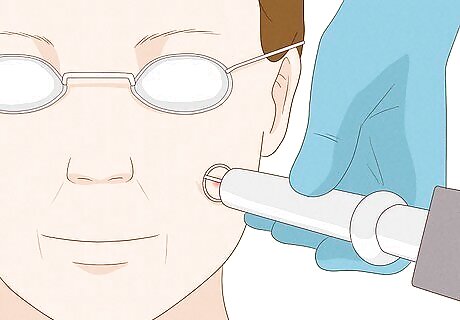
Laser resurfacing is one of the most effective non-surgical ways to tighten skin. While you're sedated, the dermatologist will use a laser beam to destroy the top layer of your skin. The new skin underneath will heal so it appears tighter. This is because the laser stimulates new collagen. You may need 3-5 treatments to see any results. Although you can get laser resurfacing across your body, if you have severe sagging, your dermatologist may recommend traditional surgery to lift the skin. This procedure is a little painful and you might experience swelling, bleeding, scarring, and discoloration after the procedure. Recovery time for laser resurfacing is around 2 weeks, although you may need more than one session to get the results you want.
Protect your skin from the sun's rays.
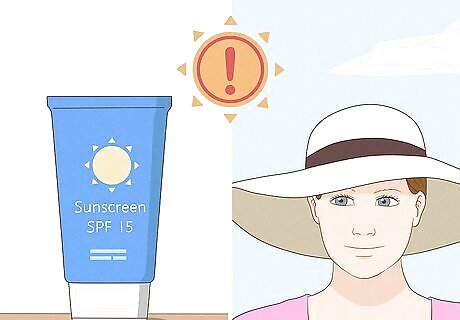
Wear sunscreen and minimize your exposure to sunlight. UV rays can cause a lot of damage to skin: loss of elasticity, wrinkles, sun spots, and rough skin to name a few. To keep your skin looking its best, apply sunscreen every day before you go outside. If it's sunny out, wear long sleeves and a hat. Try to avoid going out between 10 am and 2 pm when the rays of the sun are the most direct. Skip the tanning bed, too! The National Cancer Institute notes that UV radiation, whether from sunlight or sunlamps in tanning beds, increases the risk of developing skin cancer.
Quit smoking to stop pre-mature aging.
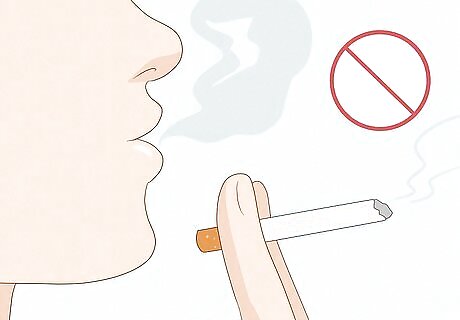
Take steps to quit or cut back on smoking so your skin can heal. Since smoking speeds up the aging process and damages collagen, your skin will heal better and look healthier when you quit. It can be hard to quit! Look for local support groups or ask your doctor for cessation tools. Feeling supported can help you successfully stop smoking.
Eat a collagen-boosting diet.
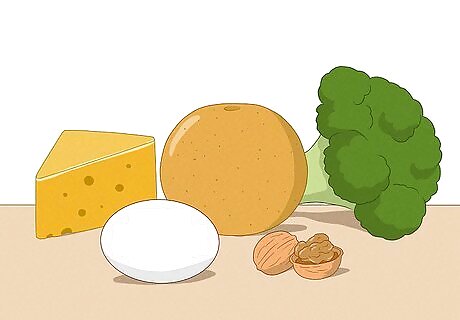
Choose healthy proteins and vitamin C so your body makes more collagen. Collagen is a protein that your skin uses to heal and repair itself. As you age, your body stops making as much collagen which can lead to looser skin and wrinkles. To help your body make collagen, eat proteins so you get amino acids and vitamin C, zinc, and copper. To get more collagen, add these foods to your diet: Chicken Fish Eggs Nuts and seeds Beans Dairy products Citrus fruits Bell peppers and tomatoes Broccoli and greens



















Comments
0 comment